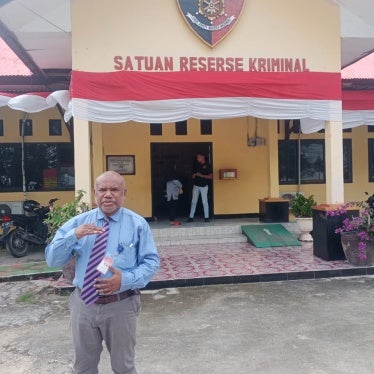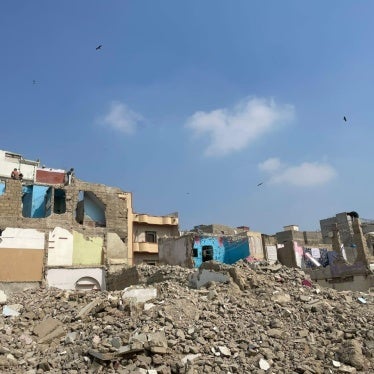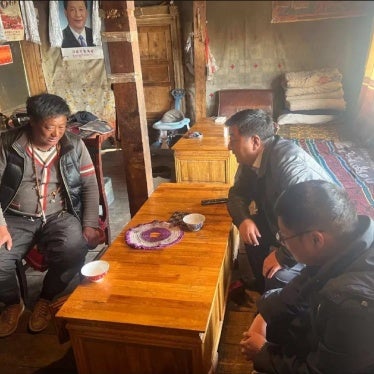Violence
A woman refugee who returned from Pakistan in early 2002 told a Human Rights Watch researcher what happened to her relatives who were attacked. She said,
A little girl was injured-they shot her with a gun. Armed men wanted to steal everything in the home-all the carpets and everything-and when my relatives tried to keep them from coming inside, they fired shots and hit the little girl. They stole all the things inside the home. It happened in the afternoon, not at night. There were a lot of men-they all had guns.
A woman who was a refugee in Iran and who recently returned to Kabul told Human Rights Watch what happened to her relatives in West Kabul:
Men went into the house and made the men go into one room and the women go inside another. They spent all night with the women-young girls and old girls. They had a chicken, and the men cooked and ate it. When they went out, they locked the women and the men inside until 2:00 p.m. When the neighbors wondered why it was so quiet, and they saw that the door was open, and they called their names and asked what was wrong. They called and asked for help and all the neighbors came and helped.
I cannot sleep well because of the security problems, because I am worried about what will happen.
A single mother with a child who had been a refugee in Pakistan but recently returned to Kabul was robbed and stabbed by a group of six assailants who entered her home at about 8:00 p.m. in September 2002:
They searched but couldn't find much money because I had spent all of my savings to repair the house, and I didn't have much jewelry. Just some rings and some necklaces. They took all of that and that of my mother. Then they took me downstairs and three or four times took me to different places in the house. They said that if I didn't tell them where I put my money they would rape me. It was the worst thing that I could see or think about. I said, "I won't let you. You can kill me but if you try to rape me I will shout and the neighbors will hear." I don't how I avoided being raped-maybe God was helping me.
As they were asking me over and over where the money was, they took a bayonet-a two-sided knife-and stabbed me, first in each leg, then in the left shoulder. They would say, "Where is the money?" and then stab me. These wounds weren't too deep-they were just to scare me. At the end when I still wouldn't tell them anything, they stabbed me very deeply in the left shoulder below my collarbone. It took eight stitches to close the wound. It nearly severed the main nerve of my arm, and the doctor told me that if had been just a little deeper I would have lost the use of my arm. I spent one night and one day in the hospital. . . . Still during the night I am scared. Whenever I hear a noise, I see the faces of those men. I thank God that they didn't rape me, that they didn't do that. Every time I see the scar on my shoulder I remember what happened.
A refugee family who recently returned from Iran to Kabul also had their house robbed by men who said they were government soldiers and tied the family up while they searched the house. One of the women in the family told Human Rights Watch what happened:
We don't have much gold, just jewelry, but they took it. The soldiers asked for it. We said, "If you take it, we will have nothing." They took it and asked for money. We said, "We have no money, you can see. We can't even make windows." My brother untied his hands to go fight [them]. A man put a Kalashnikov [AK-47 assault rifle] to my brother's head and said, "I will kill you if you don't shut up." My brother said, "If I had known you were thieves, I would have done something." They said, "We are more clever than you." For the second time, they tied his hands and feet and said, "Don't make any noise. We are from the government and you can't do anything. We are thirsty for Hazara blood. I can kill you and put you in the well. We are the enemy of the Hazaras."
Extortion During Return
Human Rights Watch also documented attacks on refugees en route to their places of origin. A refugee woman returning from Iran interviewed on March 16, 2003 in Paghman, Afghanistan told a Human Rights Watch researcher
On the way from Iran, soldiers with Kalashnikovs stole our money. I hid my daughter from the soldiers under my legs behind a blanket because she is a young girl. The soldiers put a gun to my father's back and said, "where is the money?" and I was afraid that they had killed him. I had the purse with gold and thought that they would release him if I gave it to them so I said please take it and let us go. At night we were in a hotel. It was dark and they came in. They had long hair and big turbans, Afghan dress. They were Taliban.
Political Intimidation
A former refugee who fled to Pakistan when the Taliban were in power told Human Rights Watch how he has been harassed after returning to Afghanistan because of his political activity. Currently working for a newspaper called Mashal Democracy, this former refugee told a Human Rights Watch researcher
We were the only ones to support the students who were arrested last year during the university demonstrations and we had problems because of this. The paper's owner was imprisoned for eleven days. He got out of jail with UN support. We write whatever the problem is. We don't censor anything. We are free to say all our problems. Once we wrote about Sayyaf and the commanders and why they are creating problems for the people and they sent some people who said "Why are you doing this?" Every time we publish something they send someone. This happens to every newspaper.
Restrictions on Women and Girls
A woman refugee who returned from Pakistan in early 2002, explained why she chose to go to Kabul and not back to her home province of Paghman,
There are no school buildings - there are [railroad] containers for schools. There are schools for girls - in the areas that [the] Mullah controls there are schools for girls to class six. But they can only study up to class six - then they can do nothing.
A refugee woman who had recently returned from Pakistan explained that the reason women cannot go to work in her home province is "because of Sayyaf [local warlord] and the soldiers and there is no center for women to go and work."
Another recently returned refugee woman told a Human Rights Watch researcher that "men with guns" create problems for girls. She said, "[They] don't allow girls to get an education or go to school. They have burned schools, a girls' school in Chandarbooee. It was called Omarahan school. It happened about three months ago."
A fifteen-year-old refugee girl who recently returned to Paghman from Pakistan with her family said:
I wore a chadori [burqa] for the first time today because I am inside Afghanistan. There are no schools for girls here. I studied until fifth class in Iran, but there are no schools here. I would like to study. Here there is no water, electricity. I cannot go out freely, there is no good road, no shops, no hospital, no classes. In Iran, I played tennis, volleyball, soccer, swimming.
Destruction of Homes and Insecurity in Home Provinces
A man who had returned from Iran a year ago, who decided to stay in Kabul rather than go to his family's land in Paghman, gave his reasons for not returning to Paghman:
If the armed men or soldiers come to know that there is money in your pocket or in your home, you will be robbed. Since there is no security there, and no peace, you cannot live there. Let's count the reasons you cannot live there: First, there is no security. Second, there is no chance for education, especially for girls. Third, the lack of health services: there are no birthing clinics for women to have children. Fourth, there is the culture that is imposed on people by the armed men and the clergy. For instance, the boys cannot go out bareheaded, they have got to wear a hat.
Human Rights Watch interviewed a refugee woman who recently returned to Kabul from Iran about why her family was living in a house in Kabul with four other families. She explained that her family could not go back to their home province because, "we don't have any house to stay in there. We want to go but we don't have any buildings left."
Another woman who had been a refugee in Pakistan for seven months after the U.S.-led bombing campaign in 2001 came originally from Paghman but was now living in Kabul. She explained why she could not go home to Paghman: "besides of the security problems, we would have to rebuild our house, [and] there is no hospital or clinic."







